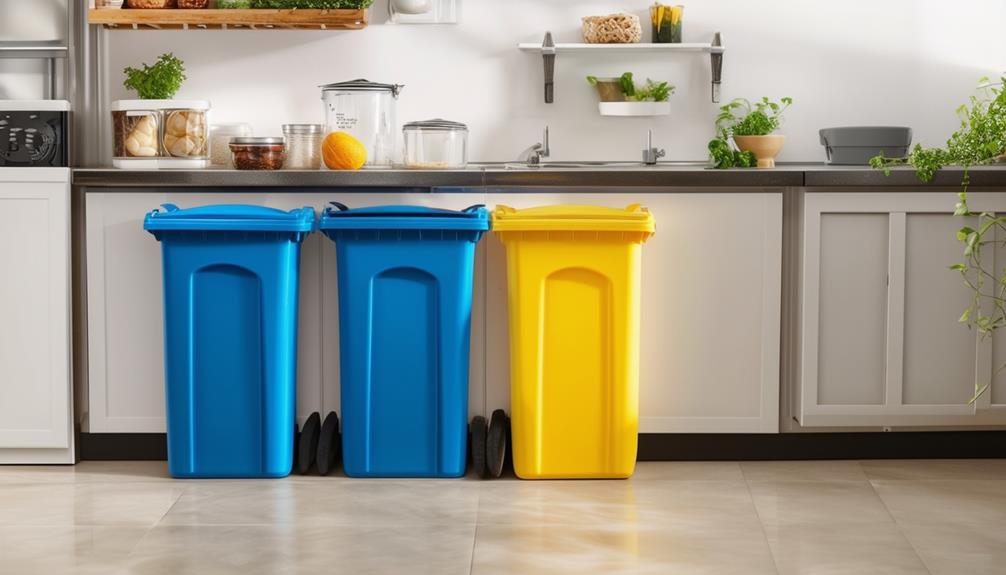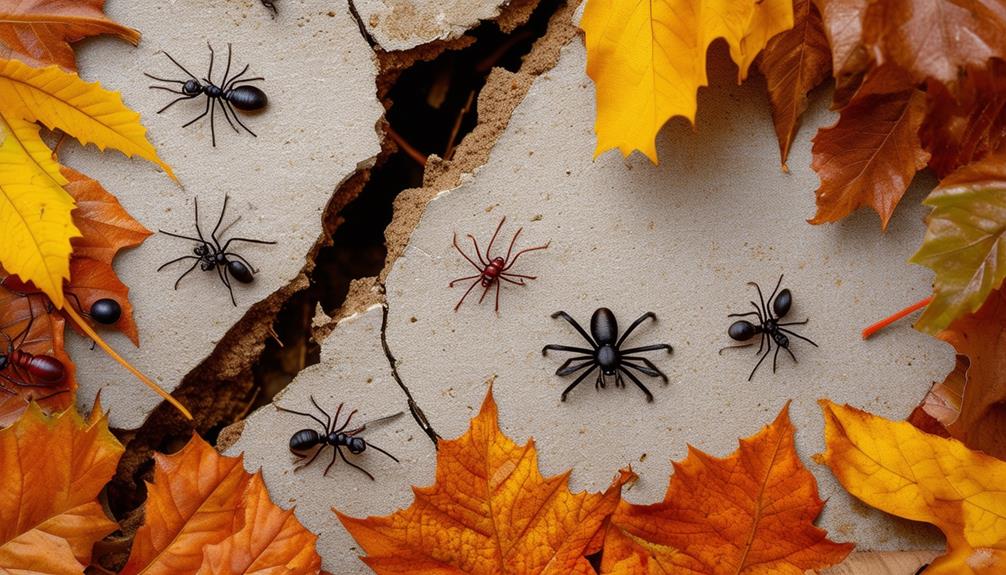Did you know that something as simple as proper waste management can have a major impact on pest prevention efforts in your surroundings? By taking the necessary steps to manage waste effectively, you can reduce the risk of pests invading your space and potentially spreading diseases. Understanding the vital role waste management plays in pest control is essential for maintaining a healthy environment. So, what specific waste management practices can help you keep pests at bay?
Key Takeaways
- Proper waste management prevents infestations by removing attractants.
- Effective waste disposal reduces the spread of diseases carried by pests.
- Regular waste disposal minimizes breeding grounds for mosquitoes.
- Organized waste management decreases hiding spots for pests.
- Secure disposal techniques deter pests from accessing food sources.
Role of Waste Management in Pest Prevention
Effective waste management plays a pivotal role in preventing pests from infesting residential and commercial spaces. When waste isn’t properly managed, it can attract pests like rodents, flies, and cockroaches due to the availability of food sources. This, in turn, can lead to an increase in pest populations, creating health risks for individuals living or working in these environments. By ensuring proper waste disposal practices, such as securing trash bins tightly and disposing of food scraps correctly, you can control the attraction of pests to your surroundings.
Furthermore, managing waste effectively helps in reducing the spread of diseases carried by pests such as rodents and cockroaches, ultimately improving public health and safety. Regular waste disposal is essential as it minimizes the risk of creating breeding grounds for pests like mosquitoes, limiting their ability to multiply and infest the area. By organizing waste management practices, you can also decrease hiding spots for pests, making it easier to detect and address potential infestations promptly.
Eliminating Food Sources for Pests
To prevent pests from infesting your surroundings, it’s essential to eliminate accessible food sources that attract rodents, flies, and cockroaches. Proper waste management plays a vital role in preventing pests from infiltrating your home or business. Here are some practical steps you can take to make sure you aren’t inadvertently inviting these unwanted guests into your space:
- Secure Your Trash Bins: Make sure your trash bins have tight-fitting lids to prevent pests from accessing discarded food.
- Dispose of Food Properly: Seal food waste in plastic bags before placing it in the trash to reduce the smell and attractiveness to pests.
- Regularly Clean Trash Bins: Cleaning your trash bins regularly with disinfectants can help remove any remaining food residue that might attract pests.
- Monitor Waste Disposal Practices: Keep an eye on how waste is being disposed of in your surroundings to identify any areas where improvements can be made to prevent pest infestations.
Preventing Breeding Grounds Effectively
When addressing the issue of pest prevention, an important aspect to consider is the effective prevention of breeding grounds that can greatly contribute to pest infestations.
Improperly disposed waste serves as a key breeding ground for pests, fostering increased pest populations. Standing water within waste materials, such as discarded containers or tires, can become ideal breeding sites for mosquitoes, worsening pest problems.
Regular waste disposal is essential in eliminating potential breeding areas for pests to thrive, reducing their populations significantly. Proper drainage systems also play a crucial role in minimizing the risk of pests multiplying by preventing the accumulation of stagnant water.
Additionally, accumulated waste provides rodents with excellent breeding opportunities, further contributing to pest infestations. By managing waste effectively and preventing the formation of breeding grounds, you can control pests more efficiently and create a less hospitable environment for them to thrive.
Importance of Proper Segregation Methods
In waste management practices, the importance of utilizing proper segregation methods can’t be emphasized enough. Proper waste segregation is vital for effective pest control and prevention. By segregating waste correctly, you can greatly reduce the risk of attracting pests and creating breeding grounds for them.
Here are some key points highlighting the importance of proper waste segregation:
- Prevent Pests: Proper segregation methods help prevent pests by eliminating food sources and breeding grounds.
- Maintain Cleanliness: Segregating waste keeps your surroundings clean and hygienic, deterring pests from infesting the area.
- Reduce Health Risks: Effective waste segregation minimizes health risks associated with pests such as contamination and diseases.
- Enhance Pest Control Efforts: Segregation facilitates pest control measures by making it easier to target specific areas where pests may thrive.
Implementing proper waste segregation practices is essential for a cleaner environment, efficient waste management, and ultimately, effective pest prevention.
Secure Disposal Techniques for Pest Control
When it comes to pest control, ensuring proper waste disposal practices and utilizing effective containment methods are key.
Securing trash bins tightly, using sealed dumpsters, and regularly emptying bins can deter pests from accessing food sources and nesting in waste areas.
Closed trash chutes and prompt waste transportation to landfills also play essential roles in minimizing pest attraction and infestation risks.
Proper Waste Disposal
To effectively prevent pests, guaranteeing proper waste disposal through securely sealing garbage cans is a fundamental practice in pest control. When waste isn’t disposed of correctly, it can attract a variety of pests like rodents, flies, and cockroaches, leading to increased pest populations and potential health risks.
Here are some key points to ponder for proper waste disposal:
- Dispose of food scraps in sealed containers to eliminate attractants for pests.
- Regularly empty garbage bins to remove potential food sources for pests.
- Clean up spills promptly to prevent pests from being attracted to the mess.
- Contemplate hiring professional pest control services to complement your waste management efforts and ensure a pest-free environment.
Effective Containment Methods
Implementing secure containment methods for waste disposal plays a significant role in effectively controlling pests and minimizing infestation risks. Securing waste disposal containers with tight lids and utilizing proper containment methods, such as sealed dumpsters, discourages pests like rodents and flies from accessing garbage and breeding in waste storage areas.
These secure disposal techniques reduce the likelihood of pest infestations by eliminating easy access to food sources. By removing attractants through secure waste management practices, such as using sealed containers, you can deter pests from scavenging for food in residential and commercial spaces.
Maintaining well-contained waste storage areas not only keeps your surroundings clean but also helps discourage pests from thriving and causing potential infestations.
Educating Communities on Responsible Waste Management
The implementation of proper waste management education within communities greatly reduces pest infestations by eliminating key food sources and breeding grounds. Educating communities on responsible waste management practices is essential for effective pest prevention. Here are some key points to keep in mind:
- Community Awareness: Increasing knowledge about responsible waste disposal methods helps in preventing pest attraction and proliferation.
- Waste Segregation: Educating individuals on separating different types of waste encourages cleanliness and reduces the risk of pest-related health hazards.
- Recycling: Promoting recycling practices not only benefits the environment but also minimizes the risks of pest infestations by reducing available food sources.
- Training for Resilience: Providing training on proper waste management techniques enhances community resilience against pest infestations, creating a more sustainable living environment for all.
Frequently Asked Questions
What Is the Main Importance of Waste Management?
When it comes to waste management, the main importance lies in waste reduction, proper disposal, recycling benefits, sanitation practices, environmental impact, resource conservation, public health, and sustainable practices. These aspects collectively contribute to a cleaner and healthier environment.
What Is the Importance of Waste Management Plan?
Reducing waste, properly disposing of it, and promoting recycling and composting benefit the environment and public health. Sustainable waste practices encourage community involvement, creating a cleaner, healthier living environment for all.
Should Garbage Cans Be Emptied to Prevent a Pest Infestation?
You should definitely empty garbage cans regularly to prevent pest infestations. Proper garbage disposal is essential for pest prevention. Maintain outdoor cleanliness, practice good hygiene habits, and guarantee regular maintenance to keep pests away and create a sanitary environment.
How Important Is Pest Management?
In preventing pest infestations, pest management is essential. Integrated pest control, proper waste disposal, and sanitation practices play key roles. Waste elimination and reducing waste have significant environmental impacts. Prioritize pest prevention to safeguard your surroundings.





